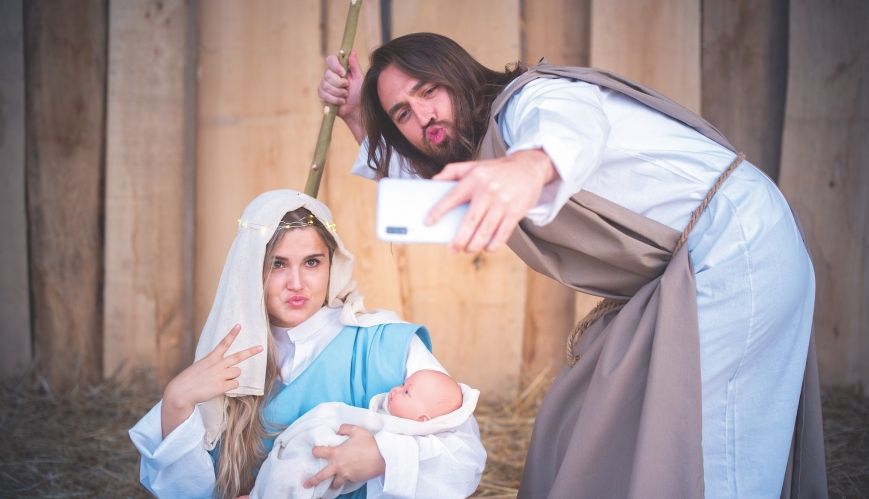An honest look at Christmas

An honest look at Christmas
18 December 2022
Social media would have had a field day with the birth of Jesus if it occurred today. Christmas (and Christianity) invites me to be honest about all the ways that I am not Insta-ready, says Natasha Moore.
I don’t send Christmas cards. I think it’s just one of those adulting memos I missed. I’m always pleased to get one, but somehow it never occurs to me to reciprocate.
I mean, what do you say? The same thing 50 times? Something unique to everyone? How long does that take! And, millennial moment: what kind of Herculean labour goes into knowing your friends’ actual postal addresses?
So, it’s with a kind of anthropological curiosity that I note the social phenomenon known as the Christmas letter. This is next level: an annual reckoning, a family portrait crafted from the odds and ends of the year. Having two kids in the gifted and talented program makes life so much busier ... that European river cruise was everything we dreamed it would be ... this year, the whole family went keto – we’ve never felt better!
Upbeat seems to be the guiding principle; experiences of loneliness or despair, that marriage is hard, that children disappoint, are entirely absent.
For obvious reasons, of course. You don’t bare your soul to all 75 of your closest friends. But is it not an odd combination – a performance for people who are close enough to require an update, but not close enough to be trusted with an honest one?
A race to the top
In this, Christmas merely ramps up the social media arms race of the rest of the year.
“One in three people ends up being unhappier at the end of spending some time on Facebook … and I am that one person of the three,” complains writer and comedian Mary Walsh. “You are judging your insides by other people’s outsides – by other people’s curated outsides.”

The irony of Christmas as a race to the top – a series of envy-inducing Instagrammable moments – is its direct inversion of the baby-Jesus-in-a-manger story. We can easily give that story the Christmas-letter treatment: add a nice filter to the scene, linger on the shepherds and angels, skip over Mary and Joseph as refugees fleeing King Herod’s massacre of local kids, and it’s cosy enough. The airbrushed version of the incarnation.
The spirit of that ‘incarnation’, though – the alleged enfleshment of God – is not positivity but vulnerability. That the invulnerable Creator of everything opts to enter the chaos and fear involved in being human. To submit to danger and constraint in order to redeem. To go low in order to lift up.
A race to the bottom
The grown Jesus will go on about this upside-downness quite a bit. The last will be first, and the first will be last, he’ll say. Whoever wants to be great must become the servant of all. The birth of Jesus fires the starting gun on a race to the bottom.
Vulnerability is a risk, but also an enormous relief – a release from the various arms races we didn’t sign up for but find ourselves running anyway. Christmas (and Christianity) invites me to be honest about all the ways that I am not Insta-ready, all the ways my life is not fit material for a Christmas letter.
“I think there is a terrible anxiety in contemporary culture about being fallible, vulnerable, or wrong about stuff,” muses British writer Francis Spufford. “And unless you’ve tried the daring experiment of saying you’re in the wrong, you’re not quite sure it’s survivable necessarily. You think that the battlements will fall, the walls will collapse, the castle of yourself will implode, and there may be nothing left but a stain on the pavement – which is not the case.
“In fact, a fallible self can be a kind of well-founded self, a self which has room for failure, and therefore room for much more as well.”
What would Christmas look like as a moment of vulnerability rather than a competitive sport? As a time to acknowledge that life is not so shiny after all? A time to say I messed up or I didn’t think my life would turn out this way or I need help ...
It takes someone brave to break the silence, to break ranks in the arms race, to own up to failing at what everyone else seems to have sorted ages ago. But just as the race to the top becomes a vicious circle, the race to the bottom can begin a virtuous one. Vulnerability calls forth vulnerability; confession calls forth confidences, and mutual trust.
Christmas is God breaking ranks and doing vulnerable first – making it safe for us. There are few more absolute pictures of vulnerability than a newborn. Christmas invites us into a new honesty – with ourselves, with one another, and (if you credit the story) with the God who chooses to be vulnerable.
Natasha Moore is Senior Research Fellow at the Centre for Public Christianity and author of For the Love of God: How the church is better and worse than you ever imagined.
This article first appeared in The Sydney Morning Herald, 22 December 2019. Reprinted with permission.
Comments
No comments yet - be the first.